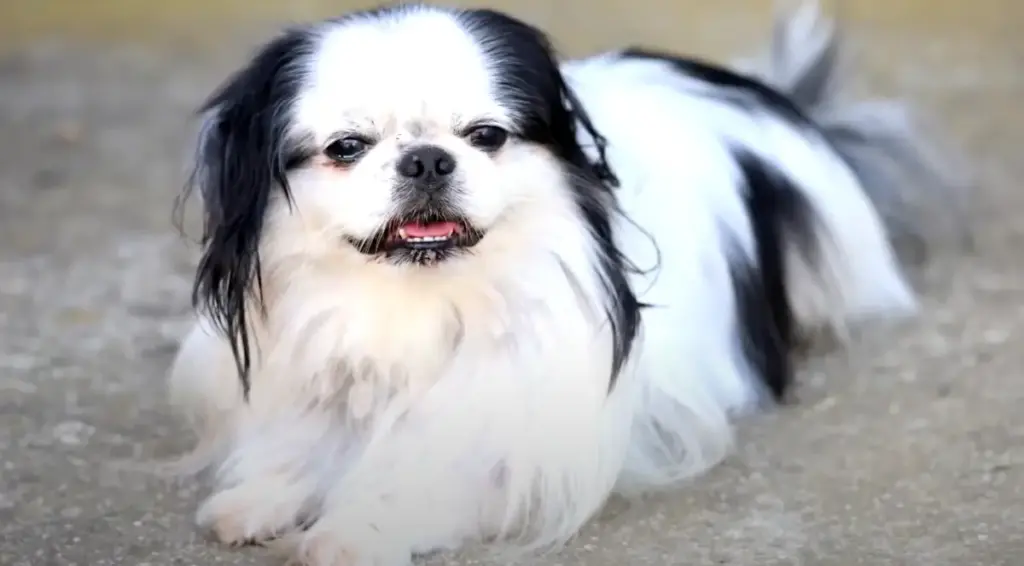Imagine a living, breathing work of art that can sit in the palm of your hand; this is the essence of the Japanese Chin, a toy dog breed that encapsulates elegance in a compact frame.
You’re likely familiar with their aristocratic yet approachable demeanor, a blend of characteristics that has charmed dog enthusiasts for centuries. With their silky, flowing coats and distinctive pushed-in faces, these dogs carry a regal air, yet you’ll find they possess a playful and loving nature that belies their stately appearance.
If you’re considering adding a canine companion, the Japanese Chin’s intelligence and adaptability might seem the perfect fit. Still, it’s important to weigh their unique needs and quirks. As we explore what sets this breed apart, you’ll uncover the nuances that could determine whether this toy dog is the harmonious addition to the home you’ve been seeking.
- Noise Level
- Energy
- Sociability
- Trainability
- Care
- Health
Overall
Summary
The Japanese Chin is moderately vocal and energetic, highly sociable, moderately trainable, requires moderate care, and generally enjoys good health.
Japanese Chin: Traits, Temperament, and Care Guide
The Japanese Chin is characterized by its distinctive Oriental expression and large, broad head. It exhibits sensitivity, intelligence, and an affectionate yet reserved demeanor. This makes it an ideal companion for those who appreciate its unique balance of elegance and comicality.
As a toy breed, the Japanese Chin stands out with its ear feathering and low-maintenance coat. However, the coat does require regular grooming to maintain its health and aesthetic appeal. Observations indicate that while they adapt well to apartment living, they may develop separation anxiety, highlighting a need for companionship.
Health issues in the Japanese Chin are breed-specific, necessitating vigilant care. Their temperament is a mix of independence and loyalty. They are quiet and polite but spirited enough to entertain. The Japanese Chin offers a harmonious blend of companionship and dignity for individuals seeking a sense of belonging.
Exploring the Characteristics of the
Japanese Chin
Building on the understanding of the Japanese Chin’s general traits, let’s examine the breed’s specific characteristics that define its unique charm and suitability as a companion animal.
| Trait | Description | Emotional Appeal |
|---|---|---|
| Appearance | Black and white coat with large wide-set eyes | Evokes a sense of pure elegance |
| Demeanor | Elegant yet comical | Fosters a feeling of joy |
| Sociability | Reserved, requires early socialization | Inspires a desire for close bonds |
| Physique | Small stature, short broad muzzle | Conveys a sense of delicate charm |
As one of the small dog breeds, the Japanese Chin’s distinct Oriental expression and low-maintenance coat set it apart. Their sensitivity and intelligence are complemented by an independent streak, which requires careful early socialization to nurture their social skills. This breed’s inherent traits resonate with those yearning for a deep, meaningful companionship.
Japanese Chin: A Comprehensive Profile and Guide
You’re about to explore the Japanese Chin’s unique profile, an analysis that encompasses their physical characteristics, behavioral traits, and care requirements.
This guide presents a scientific perspective on their compact anatomy, distinctive facial features, and implications for their health and social interactions.
You’ll understand how their historical background as aristocratic companions in Asia contributes to their status as beloved pets.
Everything You Need to Know
Delving into the world of the Japanese Chin, you’ll discover a toy breed renowned for its distinctive Oriental expression, marked by wide-set eyes and a balanced pattern of facial features. This breed’s identity is deeply rooted in its history and physical characteristics:
- Size and Lifespan: Typically weighing 4-11 pounds and standing 9-10 inches tall, Japanese Chins have an average lifespan of 12-14 years.
- Heritage: A descendant of the Tibetan Spaniel, recognized by the American Kennel Club in 1977.
- Temperament: Intelligent and sensitive, they can be reserved in new situations, yet they’re excellent family dogs.
- Coat Care and Health: The Japanese Chin’s coat requires minimal grooming. However, be mindful of potential health problems, and ensure you’re equipped with knowledge for effective dog training.
Discovering the Temperament
The temperament of the Japanese Chin encompasses a complex fusion of devoted companionship and discerning independence, making them an intriguing breed for those seeking a loyal yet self-sufficient pet.
This lap dog’s nature is a contrast study: eager to offer affection to their family, yet reserved with strangers and cautious in new situations. A Japanese Chin’s intelligence and sensitivity require a nuanced approach to Obedience training and socialization.
Understanding their temperament is about recognizing their need for a secure environment where trust can be established. Once settled, they reveal their characteristic blend of regal elegance and playful silliness.
If you aspire to join the niche community of Japanese Chin enthusiasts, delving into their temperament means embracing a dog that’s both a charming companion and a dignified individual.

Japanese Chin: Is It a Good Fit for Families?
Due to their affectionate nature and compatibility with a domestic environment, Japanese chin may be a suitable addition to your family.
Their need for minimal exercise aligns with households with limited outdoor space access.
However, their reserved demeanor around strangers underscores the importance of early socialization, particularly with children and other pets within the home.
Assessing Japanese Chin’s Compatibility with Families and Kids
When considering a Japanese Chin for your household, it’s important to note that their affectionate and gentle nature makes them excellent companions for children and adults. As potential pet parents, you should understand how this breed interacts within a family setting:
- Temperament: Japanese Chin puppies and adults are known for their loving disposition, which is ideal for creating a nurturing environment for kids.
- Size: As small dogs, they fit well into various living situations, including apartments, and are less intimidating for young children.
- Exercise: This breed requires little in terms of physical activity, matching busy family lifestyles while still enjoying playtime with children.
- Adaptability: Although reserved in new situations, early socialization can enhance their ability to integrate seamlessly with family members and other pets.
Japanese Chin: Apartment-Friendly
Considering their compact size and serene demeanor, Japanese chins are an optimal choice for residents of smaller living spaces like apartments. These small, apartment-friendly dogs possess a polite nature that ensures a peaceful coexistence with neighbors.
Their low-energy requirement aligns with the constraints of apartment living, where extensive outdoor space is often a luxury. As a companion dog, the Japanese Chin thrives on human interaction, yet they can adapt when left alone for reasonable periods. However, these dogs need regular mental stimulation within their living quarters to maintain their well-being.
Their grooming, primarily weekly brushing, is manageable even in confined spaces. Analytically speaking, the Japanese Chin’s adaptability and considerate temperament render them a harmonious addition to the apartment-dwelling community seeking a loyal and discreet pet.
Japanese Chin: Training Tips
When training your Japanese Chin, it’s crucial to acknowledge their sensitivity and respond with positive reinforcement. This approach not only motivates but also strengthens your bond.
You’ll observe that their independent streak requires patience and consistency on your part to achieve the desired behavior.
Additionally, integrating socialization into their routine aids in their adaptability to new environments and living beings.
Effective Training Strategies
To effectively train a Japanese Chin, it’s crucial to employ positive reinforcement techniques that cater to their sensitivity and intelligence. As you develop a bond with your Japanese Chin puppy, these training strategies will enhance their skills and strengthen your connection with your dog. Remember, owners of the breed must be patient, as these dogs require regular, consistent guidance.
| Strategy | Description |
|---|---|
| Positive Reinforcement | Utilize treats and praise to motivate your Japanese Chin during training. |
| Session Length | Keep training sessions short and frequent to maintain engagement. |
| Socialization | Introduce your dog to new situations early to foster adaptability. |
| Consistency | Provide gentle, reliable instruction to promote a positive response to training. |
Exercise and Grooming Needs
Although the Japanese Chin is a small breed, its exercise needs are modest, requiring only short daily walks. Due to its long, silky coat, its grooming demands regular attention. Consistent brushing is imperative to prevent tangles and matting in your dog’s coat.
Scientifically speaking, maintaining a healthy and happy Japanese Chin involves physical and hygienic care, particularly around the eyes, which are prone to problems due to their prominence.
If you’re adopting from a shelter or rescue, it’s vital to establish a grooming routine early. Often referred to as the Japanese Spaniel, this breed’s luxurious coat reflects its noble heritage and necessitates a committed approach to its care. Regular grooming fosters a bond and ensures your companion remains in prime condition.

Health Considerations
When considering the Japanese Chin, you must be mindful of its susceptibility to certain health issues. Its compact skeletal structure predisposes it to conditions like luxating patella, while its distinct facial conformation can lead to respiratory challenges.
A responsible breeding program and proactive veterinary care can help manage these risks and contribute to a healthier, longer lifespan for these dogs.
Common Health Issues and Lifespan
Japanese Chins, while typically robust in health, are predisposed to several medical conditions, including luxating patellas and heart murmurs, and have an expected lifespan of 12-14 years. If you’re considering a Japanese Chin, it’s vital to acknowledge these genetic health challenges.
Hypoglycemia is a notable risk in puppies, particularly those under six months or underweight. This breed’s distinct facial structure can lead to respiratory and ophthalmic complications, while seasonal allergies may pose a concern.
To ensure your Japanese Chin enjoys a full lifespan, commit to regular grooming and maintenance. This includes weekly brushing, occasional baths, and diligent cleaning of facial folds to mitigate skin and allergy issues.
Alternatives for Japanese Chin: Elegant and Charming Toy Breeds
For those who adore the Japanese Chin’s elegance and charm, these toy breeds offer a similar blend of grace and delightful temperament.
| Similar Dogs | Short Description |
|---|---|
| Pekingese | A breed with a regal history, known for its distinctive appearance and loyal nature. |
| Shih Tzu | A lovable toy breed, great for cuddling and companionship with a friendly disposition. |
| Papillon | Known for its distinctive butterfly-like ears and lively, friendly temperament. |
| Maltese | A gentle and affectionate toy breed, known for its luxurious white coat. |
| Cavalier King Charles Spaniel | A breed with a big heart, known for its friendliness and affectionate nature. |
Is Japanese Chin the Right Dog for You?
Considering the unique blend of affection, low-maintenance care, and sensitivity, a Japanese Chin may be ideal for individuals seeking a gentle and adaptable companion.
First recognized by the Chin Club of America, this breed has charmed enthusiasts for years with its dignified yet comical nature.
Whether you’re considering a puppy or adult dog, ensure you’re ready for a pet that thrives on emotional connection and can mirror your feelings.
The Japanese Chin, hailed by some as the ‘Best Dog’ for less active people, still requires your commitment to their well-being.
Given their propensity for certain health conditions, it’s crucial to understand their needs clearly.
Only with years of experience in companionship can the nuances of a Japanese Chin’s care become second nature.
Conclusion
In conclusion, the Japanese Chin is a delightful breed, blending intelligence with a playful demeanor. Imagine watching ‘Kiko,’ a Chin, skillfully navigating social gatherings, showcasing its breed’s sensitivity and charm.
They require moderate care, making them suitable for various owners. However, their need for gentle companionship and potential health issues should be carefully considered.
Analytically, the Japanese Chin is a remarkable toy breed, offering affection and entertainment to those who understand their unique nature.
